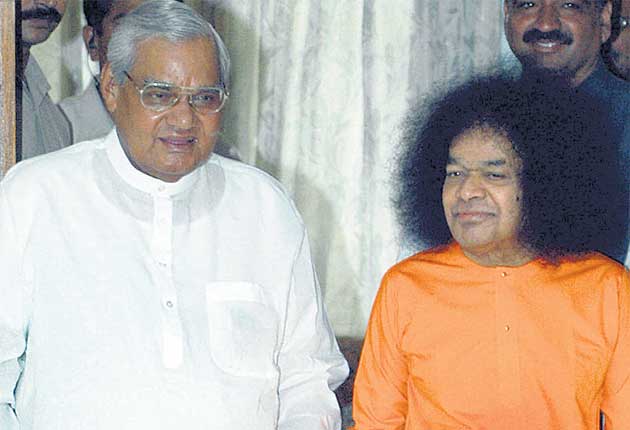Bitter battle over Indian holy man's £5bn legacy
Sai Baba's death left no successor and allegations swirling around his piles of gold, jewels and cash. By Andrew Buncombe

It has been two months since the controversial Indian holy man Sai Baba passed away, leaving a swirling legacy and a network said to be worth at least £5bn. Since then there have been allegations of financial malpractice, claims of death threats and uncertainty as to who may seek to try to lead the movement he established in the south of India and which has since spread to 126 countries.
Yesterday, members of the trust that controls his network, sought to draw a line under at least some of the turmoil when they broke their silence and said they had already paid tax on piles of gold, silver and cash that was found in the holy man's private chambers following his death.
"Even without a demand we paid 97m rupees (£1.3m) as income tax and the balance, if any, will be paid after the valuation of the gold and jewellery," trust member V Srinivasan, told a press conference, according to a report by Agence France-Presse. "We had no knowledge about the money... it was given to him and Sai Baba kept it for public use. He was an embodiment of simplicity and did not even have a bank account of his own. He never kept anything for himself."
The move by the trust followed weeks of claims and allegations about the handing of the estate of the holy man, which included 98kg of gold, 307kg of silver and 115m rupees (£1.5m) in cash that was discovered in his chambers. The rooms inside the ashram at Puttaparthi in the state of Andhra Pradesh had been shut when the 86-year-old was hospitalised at the end of March and only reopened two weeks ago, when the currency and treasure was found.
The organisation was also shaken by allegations from a relative of Sai Baba, who claimed someone with the trust had been threatening her. Chetana Raju, a niece said a trust member had levelled death threats at her. It has also had to try to explain why police had stopped a private vehicle carrying more than 3.5m rupees in cash belonging to the trust. Mr Srinivasan said yesterday the money had been set aside to build a mausoleum for Sai Baba and that the task had been contracted out to a private company. "The [mausoleum] is not being built by the trust as it cannot do religious activity," he said.
When he died at the end of April, having suffered multiple organ failure, many predicted his death would trigger a long and bitter fight. A major problem was that the man who counted film stars and politicians among his supporters and who had mesmerised audiences with his performances, in which he apparently pulled ash from his hair, had not named a successor to carry on his work.
There have been calls for the authorities to do more to monitor the trust and earlier this week, the state government wrote and asked for an account of all its financial transactions and donations since 2009.
Some reports have suggested chief minister Kiran Kumar Reddy is considering taking over the running of the organisation. His endowments minister Ponnala Lakshmaiah told reporters the trust had already enjoyed several exemptions, but he said there was now a need for greater transparency. "Now there are several allegations of financial irregularities," he added. "We have sought a report from the Trust and we will decide what to do later."
Mr Srinivasan, an industrialist from the city of Chennai and the man who has emerged as the trust's de facto spokesman, said the organisation would cooperate. "If an enquiry comes from the government, then we will promptly attend to it and if the government wants to monitor us, we have no problem," he said.
But some observers suggest the authorities may be disinclined to probe too deeply into the matter. Meera Nanda, a sociologist and author of The God Market, said the Indian government had been generous in affording non-taxable status to many religious organisations without imposing any restrictions or regulations. "There are deep cultural reasons for that," she said. "The political leaders share the faith in the miracles, they treat them like gods. Look how Sai Baba was treated- like he was a demi-god."
When news of Sai Baba's death was announced, thousands thronged to the ashram he set up decades ago and he was granted a state funeral. Yet others pointed out that the guru, who never married and had no children, was an often controversial figure; he had been accused of sexually abusing some of his countless followers, though he dismissed the claims.
Join our commenting forum
Join thought-provoking conversations, follow other Independent readers and see their replies
Comments
Bookmark popover
Removed from bookmarks